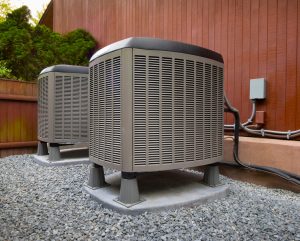 If you looked up the word refrigerant in a dictionary, you’d probably come across a definition like this:
If you looked up the word refrigerant in a dictionary, you’d probably come across a definition like this:
re·frig·er·ant: noun 1. A substance used for refrigeration.
Not terribly informative or helpful, is it? If you’re curious about what the refrigerant in your home’s air conditioning system is, how it actually provides cooling, and why it’s so important, we’re here to give the dictionary a bit of help.
The Basics of AC Refrigerant
Refrigerant is a blend or compound of different chemicals used for the process of heat exchange in an air conditioner. (It serves a similar process in refrigerators and freezers.) There are different types of refrigerants, which are usually referred to as blends. The blend used in most home air conditioners is known as R-410A or Puron, which is a brand name. This blend is made of hydrofluorocarbons and contains no chlorine like older blends such as R-22 did, making it more efficient and also better for the environment.
The key quality any refrigerant must have is the ability to easily change from liquid to gaseous state. When the refrigerant changes from liquid to gas, it evaporates and absorbs heat. When it changes from gas to liquid, it condenses and releases heat. This is how it’s able to carry out heat exchange and cool down a house.
What Is Heat Exchange?
This is the basic way an AC provides cooling to a home. An air conditioning system doesn’t create cooling. What it does is remove heat from the air in a house, lowering its temperature so it can then be blown about into the ductwork and the living spaces. Of course, the heat removed from the house has to go somewhere: it’s released to the outdoors through the exterior cabinet of the AC.
Refrigerant is responsible for this transfer of heat. The refrigerant passes through the indoor coil where it absorbs heat along the evaporator coil. It is then moved outdoors (pushed along by the compressor) and releases its heat through the evaporator coil. The refrigerant shifts back and forth between liquid and gas state to continue this cycle of heat exchange.
Loss of Refrigerant / Too Much Refrigerant
You might be able to tell from our above description that refrigerant doesn’t get used up during heat exchange. The amount of refrigerant in an AC, known as the system’s charge, stays the same throughout the system’s service life. It isn’t a fuel source the system has to consume.
However, an air conditioner can lose refrigerant due to pinhole leaks or even larger leaks along the copper refrigerant lines. Loss of refrigerant is a serious problem because it changes the pressure in the system. An AC is built for a specific charge of refrigerant, and if it declines, it can mean permanent damage to the compressor—even an early replacement. Likewise, too much refrigerant (which might happen because of amateur repair attempts) can cause the compressor to break down. Leave all work with refrigerant leaks and other AC repairs in Shreveport, LA in the hands of licensed and trained professionals.
Call the Doctor of Home Comfort today: Hall’s Heating, Air Conditioning & Refrigeration guarantees our work 100%!


